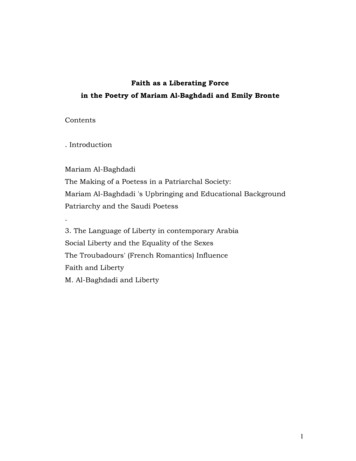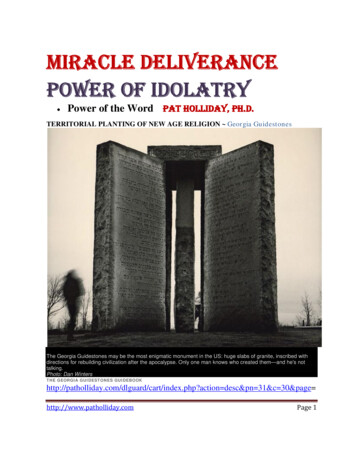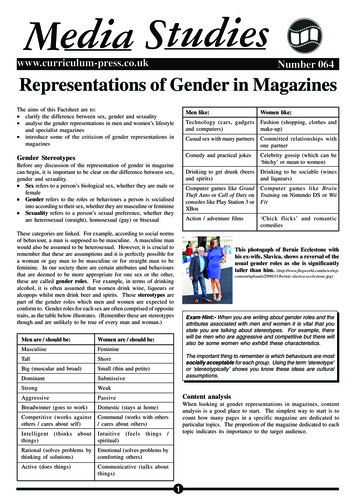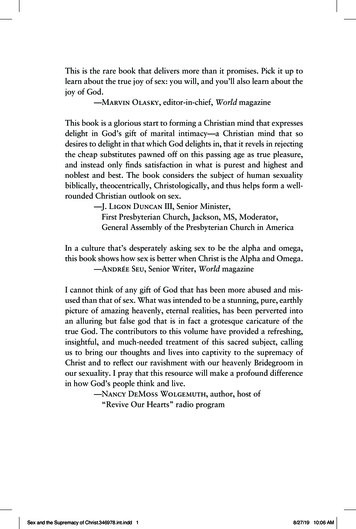
Transcription
From Sex to SuperconsciousnessTalks given from 01/8/68 to 30/10/68Original in Hindi5 ChaptersYear published: 1979Original Hindi title "Sambhog Ke Samadhi Se".
From Sex to SuperconsciousnessChapter #1Chapter title: Sex, the genesis of love28 August 1968 pm in Gowalior Tank MaidanQuestion 1WHAT IS LOVE?To feel it is easy, to define love is difficult indeed. If you ask a fish what the sea is like, the fish will say,"This is the sea. The sea is all around. And that's that." But if you insist -- "Please define the sea" -- thenthe problem becomes very difficult indeed.The finest and the most beautiful things in life can be lived, can be known, but they are difficult todefine, difficult to describe.Man's misery is this: for the last four to five thousand years he has simply talked and talked aboutsomething he should have been living earnestly, about something that must be realized from within -about love. There have been great talks on love, countless love songs have been sung, and devotionalhymns are continuously being chanted in the temples and in the churches -- what all isn't done in thename of love? -- still there is no place for love in man's life. If we delve deeply into mankind's languages,we will not find a more untrue word than "love".All the religions carry on about love, but the kind of love that is found everywhere, the kind of love thathas enveloped man like some hereditary misfortune has only succeeded in closing all the gates to love inman's life. But the masses worship the leaders of the religions as the creators of love. They have falsifiedlove; they have blocked all love's streams. In this case there is no basic difference between East andWest, between India and America.The stream of love has not yet surfaced in man. And we attribute this to man himself. We say it isbecause man is spoiled that love has not evolved, that there is no current of love in our lives. We blameit on the mind; we say the mind is poisonous. The mind is not poison. Those who degrade the mind havepoisoned love; they have not allowed the growth of love. Nothing in this world is poison. Nothing is badin God's whole creation; everything is nectar. It is man alone who has transformed this full cup of nectarinto poison. And the major culprits are the so-called teachers, the so-called holy men and saints, thepoliticians.Reflect upon this in detail. If this sickness is not understood immediately, if it is not straightened outright away, there is no possibility -- now or in the future -- of love in man's life.
The ironical thing is that we have blindly accepted the reasons for this from the very same sources thatare to blame for love's not dawning on the human horizon in the first place. If misleading principles arerepeated and reiterated down the centuries we fail to see the basic fallacies behind the originalprinciples. And then chaos is created, because man is intrinsically incapable of becoming what theseunnatural rules say he should become. We simply accept that man is wrong.In ancient times, I have heard, a hawker of hand-fans used to pass by the palace of the king every day.He used to brag about the unique and wonderful fans he sold. No one, he claimed, had ever seen suchfans before.The king had a collection of all sorts of fans from every corner of the world and so he was curious. Heleaned over his balcony one day to have a look at this seller of unique and wonderful fans. To him thefans looked ordinary, hardly worth a penny, but he called the man upstairs anyway. The king asked,"What is the uniqueness of those fans? And what is their price?"The hawker replied, "Your Majesty, they don't cost much. Considering the quality of these fans, the priceis very low: one hundred rupees a fan."The king was amazed. "One hundred rupees! This paisa-fan, this penny-fan, is available anywhere in themarket. And you ask a hundred rupees! What is so special about these fans?"The man said, "The quality! Each fan is guaranteed to last one hundred years. Even in one hundredyears, it won't spoil.""From the look of it, it seems impossible it can even last a week. Are you trying to cheat me? Is thisoutright fraud? And with the king, too?"The vendor answered, "My Lord, would I dare? You know very well, sir, that I walk under your balconydaily, selling my fans. The price is one hundred rupees a fan, and I am responsible if it doesn't last onehundred years. Every day I am available in the street. And, above all, you are the ruler of this land. Howcan I be safe if I cheat you?"The fan was purchased at the asking price. Although the king did not trust the hawker, he was dying ofcuriosity to know what grounds the man had for making such a statement. The vendor was ordered topresent himself again on the seventh day.The central stick came out in three days, and the fan disintegrated before the week was out.The king was sure the seller of fans would never turn up again, but to his complete surprise the manpresented himself as he had been asked to -- on time, on the seventh day."At your service, Your Majesty."The king was furious. "You rascal! You fool! Look. There lies your fan, all broken into pieces. This is itscondition in a week, and you guaranteed it would last a hundred years! Are you mad, or just asupercheat?"
The man replied humbly, "With due respect, it seems My Lord does not know how to use fans. The fanmust last for one hundred years; it is guaranteed. How did you fan?"The king said, "My goodness. Now I will have to learn how to fan too!""Please don't be angry. How did the fan come to this fate in just seven days? How did you fan?"The king lifted the fan, showing the manner in which one fans.The man said, "Now I understand. You shouldn't fan like that.""What other way is there?" the king asked.The man explained, "Hold the fan steady. Keep it steady in front of you and then move your head to andfro. The fan will last one hundred years. You will pass away but the fan will remain intact. Nothing iswrong with the fan; the way you fan is wrong. You keep the fan steady and move your head. Where ismy fan at fault? The fault is yours, not that of my fan."Mankind is accused of a similar fault. Look at humanity. Man is so sick, sick from the accumulated illnessof five, six, ten thousand years. It is repeatedly said that it is man who is wrong, not the culture. Man isrotting, yet the culture is praised. Our great culture! Our great religion! Everything is great! And see thefruits of it!They say, "Man is wrong; man should change himself," yet no one stands up to question whether thingsaren't like they are because our culture and religion, unable to fill man with love after ten thousandyears, are based on false values. And if love hasn't evolved in the last ten thousand years, take it fromme there is no future possibility, based on this culture and religion, of ever seeing a loving man.Something which could not be achieved in the last ten thousand years cannot be attained in the next tenthousand years. Today's man will be the same tomorrow. Although the outer wrappings of etiquette,civilization and technology change from time to time, man is the same and will be the same forever.We are not prepared to review our culture and religion, yet we sing their praises at the top of our lungs,and kiss the feet of their saints and custodians. We won't even agree to look back, to reflect upon ourways and upon the direction of our thinking, to check if they are not misleading, to see if they are not allwrong.I wish to say that the base is defective, that the values are false. The proof is today's man. What otherproof can there be?If we plant a seed and the fruit is poisonous and bitter, what does it prove? It proves that the seed musthave been poisonous and bitter. But it is difficult, of course, to foretell whether a particular seed willgive bitter fruit or not. You may look it over carefully, press it or break it open, but you cannot predictfor sure whether the fruit will be sweet or not. You have to await the test of time.Sow a seed. A plant will sprout. Years will pass. A tree will emerge, will spread its branches to the sky,will bear fruit -- and only then will you come to know whether the seed that was sown was bitter or not.
Modern man is the fruit of those seeds of culture and religion that were sown ten thousand years agoand have been nurtured ever since. And the fruit is bitter; it is full of conflict and misery.But we are the very people who eulogize those seeds and expect love to flower from them. It is not tobe, I repeat, because any possibility for the birth of love has been killed by religion. The possibility hasbeen poisoned. More so than in man, love can be seen in the birds, animals and plants, in those whohave no religion or culture. Love is more evident in uncivilized men, in backward woodsmen, than in theso-called progressive, cultured and civilized men of today. And, remember, the aboriginal people haveno developed civilization, culture or religion.Why is man progressively becoming so much more barren of love as he professes to be more and morecivilized, cultured and religious, going regularly to temples and to churches to pray? There are somereasons and I wish to discuss them. If these can be understood, the eternal stream of love can springforth. But it is embedded in stones; it cannot surface. It is walled in on all sides, and the Ganges cannotgush forth, cannot flow freely.Love is within man. It is not imported from the outside. It is not a commodity to be purchased when wego to the markets. It is there as the fragrance of life. It is inside everyone. The search for love, thewooing of love, is not a positive action; it is not an overt act whereby you have to go somewhere anddraw it out.A sculptor was working on a rock. Someone who had come to see how a statue is made saw no sign of astatue, he only saw a stone being cut here and there by a chisel and hammer."What are you doing?" the man inquired. "Are you not going to make a statue? I have come to see astatue being made, but I only see you chipping stone."The artist said, "The statue is already hidden inside. There is no need to make it. Somehow, the uselessmass of stone that is fused to it has to be separated from it, and then the statue will show itself. A statueis not made, it is discovered. It is uncovered; it is brought to light."Love is shut up inside man; it need only be released. The question is not how to produce it, but how touncover it. What have we covered ourselves with? What is it that will not allow love to surface?Try asking a medical practitioner what health is. It is very strange, but no doctor in the world can tell youwhat health is! With the whole of medical science concerned with health, isn't there anyone who is ableto say what health is? If you ask a doctor, he will say he can only tell you what the diseases are or whatthe symptoms are. He may know the different technical term for each and every disease and he mayalso be able to prescribe the cure. But health? About health, he does not know anything. He can onlystate that what remains when there is no disease is health. This is because health is hidden inside man.Health is beyond the definition of man.Sickness comes from the outside hence it can be defined; health comes from within hence it cannot bedefined. Health defies definition. We can only say that the absence of sickness is health. The truth is,
health does not have to be created; it is either hidden by illness or it reveals itself when the illness goesaway or is cured. Health is inside us. Health is our nature.Love is also inside us. Love is our inherent nature. Basically, it is wrong to ask man to create love. Theproblem is not how to create love, but how to investigate and find out why it is not able to manifestitself. What is the hindrance? What is the difficulty? Where is the dam blocking it?If there are no barriers, love will show itself. It is not necessary to persuade it or to guide it. Every manwould be filled with love if it weren't for the barriers of false culture and of degrading and harmfultraditions. Nothing can stifle love. Love is inevitable. Love is our nature.The Ganges flows from the Himalayas. It is water; it simply flows -- it does not ask a priest the way to theocean. Have you ever seen a river standing at a crossroads asking a policeman the whereabouts of theocean? However far the ocean may be, however hidden it may be, the river will surely find the path. It isinevitable: she has the inner urge. She has no guidebook, but, infallibly, she will reach her destination.She will crack through mountains, cross the plains and traverse the country in her race to reach theocean. An insatiable desire, a force, an energy exists within her heart of hearts.But suppose obstructions are thrown in her way by man? Suppose dams are constructed by man? Ariver can overcome and break through natural barriers -- ultimately they are not barriers to her at all -but if man-made barriers are created, if dams are engineered across her, it is possible she may not reachthe ocean. Man, the supreme intelligence of creation, can stop a river from reaching the ocean if hedecides to do so.In nature, there is a fundamental unity, a harmony. The natural obstructions, the apparent oppositionsseen in nature, are challenges to arouse energy; they serve as clarion calls to arouse what is latentinside. There is no disharmony in nature.When we sow a seed, it may seem as if the layer of earth above the seed is pressing it down, isobstructing its growth. It may seem so, but in reality that layer of earth is not an obstruction; withoutthat layer the seed cannot germinate. The earth presses down on the seed so that it can mellow,disintegrate, and transform itself into a sapling. Outwardly it may seem as if the soil is stifling the seed,but the soil is only performing the duty of a friend. It is a clinical operation. If a seed does not grow intoa plant, we reason that the soil may not have been proper, that the seed may not have had enoughwater or that it may not have received enough sunlight -- we do not blame the seed. But if flowers donot bloom in a man's life we say the man himself is responsible for it. Nobody thinks of inferior manure,of a shortage of water or of a lack of sunshine and does something about it, the man himself is accusedof being bad. And so the plant of man has remained undeveloped, has been suppressed byunfriendliness and has been unable to reach the flowering stage.Nature is rhythmic harmony. But the artificiality that man has imposed on nature, the things he hasengineered across it and the mechanical contrivances he has thrown into the current of life have createdobstructions at many places, have stopped the flow. And the river is made the culprit. "Man is bad; theseed is poisonous," they say.
I wish to draw your attention to the fact that the basic obstructions are man-made, are created by manhimself -- otherwise the river of love would flow freely and reach the ocean of God. Love is inherent inman. If the obstructions are removed with awareness, love can flow. Then, love can rise to touch God, totouch the Supreme.What are these man-made obstacles? The most obvious obstruction has been the opposition to sex andto passion. This barrier has destroyed the possibility of the birth of love in man.The simple truth is that sex is the starting point of love. Sex is the beginning of the journey to love. Theorigin, the Gangotri of the Ganges of Love, is sex, passion -- and everybody behaves like its enemy. Everyculture, every religion, every guru, every seer has attacked this Gangotri, this source, and the river hasremained bottled up. The hue and cry has always been, "Sex is sin. Sex is irreligious. Sex is poison," butwe never seem to realize that ultimately it is the sex energy itself that travels to and reaches the innerocean of love. Love is the transformation of sex energy. The flowering of love is from the seed of sex.Looking at coal, it would never strike you that when coal is transformed it becomes diamonds. Theelements in a lump of coal are the same as those in a diamond. Essentially, there is no basic differencebetween them. After passing through a process taking thousands of years, coal becomes diamonds.But coal is not considered important. When coal is kept in a house it is stored in a place where it maynot be seen by guests, whereas diamonds are worn around the neck or on the bosom so that everybodycan see them. Diamonds and coal are the same: they are two points on a journey by the same element.If you are against coal because it has nothing more to offer than black soot at first glance, the possibilityof its transformation into a diamond ends right there. The coal itself could have been transformed into adiamond. But we hate coal. And so, the possibility of any progress ends.Only the energy of sex can flower into love. But everyone, including mankind's great thinkers, is againstit. This opposition will not allow the seed to sprout, and the palace of love is destroyed at thefoundation. The enmity towards sex has destroyed the possibility of love. And so, coal is incapable ofbecoming a diamond.Because of basic misconceptions, no one feels the necessity of going through the stages ofacknowledging sex and of developing it and of going through the process of transforming it. How can wetransform him whose enemy we are, whom we oppose, with whom we are at continuous war? A quarrelbetween man and his energy has been forced upon him. Man has been taught to fight against his sexenergy, to oppose his sex urges."The mind is poison, so fight against it," man is told. The mind exists in man, and sex also exists in him -yet man is expected to be free from inner conflicts. A harmonious existence is expected of him. He hasto fight and to pacify as well. Such are the teachings of his leaders. On the one hand they drive him madand on the other they open asylums to treat him. They spread the germs of sickness and then buildhospitals to cure the sick.
Another important consideration is that man cannot be separated from sex. Sex is his primary point; heis born of it. God has made the energy of sex the starting point of creation. And great men term as sinfulwhat God himself does not consider as sin! If God considers sex as sin, then there is no greater sinnerthan God in this world, no greater sinner in this universe.Have you never realized that the blooming of a flower is an expression of passion, that it is a sexual act?A peacock dances in full glory: a poet will sing a song to it; a saint will also be filled with joy -- but aren'tthey aware that the dance is also an overt expression of passion, that it is primarily a sexual act? Forwhose pleasure does the peacock dance? The peacock is calling its beloved, its spouse. Papiha is singing;the cuckoo is singing: a boy has become an adolescent; a girl is growing into a woman. What is all this?What play, what leela is this? These are all the indicators of love, of sexual energy. These manifestationsof love are the transformed expressions of sex -- bubbling with energy, acknowledging sex. Throughoutone's whole life all acts of love, all attitudes and urges of love, are flowerings of primary sex energy.Religion and culture pour poison against sex into the mind of man. They create conflict, war; theyengage man in battle against his own primary energy -- and so man has become weak, gross, coarse,devoid of love and full of nothingness. Not enmity, but friendship is to be made with sex. Sex should beelevated to purer heights.While blessing a newly wed couple, a sage said to the bride, "May you be the mother of ten childrenand, ultimately, may your husband become your eleventh child."If passion is transformed, the wife can become the mother; if lust is transcended, sex can become love.Only sex energy can flower into the force of love. But we have filled man with antagonism towards sexand the result is that love has not flowered. What comes later, the form-to-come, can only be madepossible by the acceptance of sex. The stream of love cannot break through because of the strongopposition. Sex, on the other hand, keeps churning inside, and the consciousness of man is muddledwith sexuality.Man's consciousness is becoming more and more sexual. Our songs, poems, paintings, and virtually allthe figures in our temples are centered around sex -- because our minds also revolve around the axis ofsex. No animal in the world is as sexual as man. Man is sexual everywhere -- awake or asleep, in hismanners as well as in his etiquette. Every moment man is haunted by sex.Because of this enmity towards sex, because of this opposition and suppression, man is decaying frominside. He can never free himself from something that is the very root of his life, and because of thisconstant inner conflict his entire being has become neurotic. He is sick. This perverted sexuality that isso evident in mankind is the fault of his so-called leaders and saints; they are to blame for it. Until manfrees himself from such teachers, moralizers and religious leaders, and from their phony sermons, thepossibility of love surfacing in him is nil.I remember a tale:
One Sunday a poor farmer was leaving his house and at the gate he met a childhood friend who hadcome to see him.The farmer said, "Welcome! But where have you been for so many years? Come in! Look, I havepromised to see some friends and it would be difficult to postpone the visit, so please rest in my house. Iwill be back in an hour or so. I will return soon and we can have a long chat."The friend said, "Oh no, wouldn't it be better if I were to come with you? Yet my clothes are very dirty. Ifyou can just give me something fresh, I will change and come along with you."Sometime before, the king had given the farmer some valuable clothes and the farmer had been savingthem for some grand occasion. Joyfully, he brought them out. His friend put on the precious coat, theturban, the dhoti and the beautiful shoes. He looked like the king himself. Looking at his friend, thefarmer felt a bit jealous; in comparison he looked like a servant. He began to wonder if he had made amistake, giving away his best outfit, and he began to feel inferior. Now everyone would look at hisfriend, he thought, and he would look like an attendant, like a servant.He tried to calm his mind by thinking of himself as a good friend and as a man of God. He would thinkonly of God and of noble things, he decided. "After all, of what importance is a fine coat or an expensiveturban?" But the more he tried to reason with himself, the more the coat and the turban encroached onhis mind.On the way, although they were walking together, passers-by only looked at his friend; nobody noticedthe farmer. He began to feel depressed. He chatted with his friend, but inside he was thinking aboutnothing else but that coat and turban!They reached the house they were intending to visit and he introduced his friend: "This is my friend, achildhood friend. He is a very lovely man." And suddenly he blurted, "And the clothes? They are mine!"The friend was stunned. Their hosts were also surprised. He realized as well that the remark had beenuncalled for, but then it was too late. He regretted his blunder and reproached himself inwardly.Coming out of the house, he apologized to his friend.The friend said, "I was thunderstruck. How could you say something like that?"The farmer said, "Sorry. It was just my tongue. I made a mistake."But the tongue never lies. Words only pop out of one's mouth if there is something on one's mind; thetongue never makes a mistake. He said, "Forgive me. How such a thing was uttered, I do not know." Buthe knew full well that the thought had surfaced from his mind.They started for another friend's house. Now he had firmly resolved not to say that the clothes were his;he had steeled his mind. By the time they had reached the gate he had reached an irrevocable decisionthat he would not say the clothes were his.
That poor man didn't know that the more he resolved not to say anything, the more firmly rooted theinner awareness that the clothes belonged to him became. Moreover, when are such firm decisionsmade? When a man makes a firm resolution, like a vow of celibacy for example, it means that hissexuality is pushing desperately from inside. If a man resolves he will eat less or will fast from today on,it implies he has a deep desire to eat more. Such efforts inevitably result in inner conflict. We are whatour weaknesses are. But we decide to curb them; we resolve to fight against them -- and naturally, thisbecomes a source of subconscious conflict.So, engaged in inner struggle, our farmer went into the house. He began very carefully: "He is my friend"-- but he noticed that nobody was paying any attention to him; that everybody was looking at his friendand at his clothes with awe, and it struck him, "That is my coat! And my turban!" But he remindedhimself again not to talk about the clothes. He was resolved. "Everybody has clothes of some kind oranother, poor or rich. It is a trivial matter," he explained to himself. But the clothes swung before hiseyes like a pendulum, to and fro, to and fro.He resumed the introduction: "He is my friend. A childhood friend. A very fine gentleman. And theclothes? Those are his, and not mine."The people were surprised. They had never before heard such an introduction: "The clothes are his andnot mine"!After they had left, he again apologized profusely. "A big blunder," he admitted. Now he was confusedabout what to do and what not to do. "Clothes never had a hold on me like this before! Oh God, whathas happened to me?"What had happened to him? The poor fellow did not know that the technique he was using on himself issuch that even if God himself tried it, the clothes would grab hold of him also!The friend, now quite indignant, said he would not go any further with him. The farmer grabbed his armand said, "Please don't do that. I would be unhappy for the rest of my life, having shown such badmanners to a friend. I swear not to mention the clothes again. With my whole heart, I swear to God I willnot mention the clothes any more."But one should always be wary of those who swear because there is something much deeper involvedwhen one resolves something. A resolution is made by the surface mind, and the thing against which theresolution has been taken remains inside in the labyrinths of the subconscious mind. If the mind weredivided into ten parts, it would only be one part, just the upper part, that was committed to the resolve;the remaining nine parts would be against it. The vow of celibacy is taken by one part of the mind, forexample, while the rest of the mind is mad for sex -- while the rest is crying out for that very thing thathas been implanted in man by God. But for the moment, be that as it may.They went to a third friend's house. The farmer held himself back rigorously. Restrained people are verydangerous, because a live volcano exists inside them. Outwardly they are rigid and full of restraint, whiletheir urge to let go is tightly harnessed inside.
Please remember, anything that is forced can neither be continuous nor complete because of theimmense strain involved. You have to relax sometime; sometime you have to rest. How long can youclench your fist? Twenty-four hours? The tighter you clench it, the more it tires, and the more quickly itwill open up. Work harder, expend some more energy, and you will tire even more quickly. There isalways a reaction to an action, and it is always just as prompt. Your hand can remain open all the time,but it cannot remain clenched in a fist all the time. Anything that tires you cannot be a natural part oflife. Whenever you force something, a period of rest is bound to follow. And so, the more adept a saintis, the more dangerous he is. After twenty-four hours of restraint, following the rules of the scriptures,he will have to relax for at least an hour, and during this period there will be such an upsurge ofsuppressed sins he will find himself in the midst of hell.So, the farmer held himself rigorously in check so as not to speak of the clothes. Imagine his condition. Ifyou are even a little religious, you can imagine his state of mind. If you have ever been sworn in, ortaken a vow, or restrained yourself for some religious cause, you will understand the pitiable state of hismind very well.They went into the next house. The farmer was perspiring all over; he was exhausted. The friend wasalso worried.The farmer was frozen with anxiety. Slowly and carefully he uttered each and every word, of theintroduction: "Meet my friend. A very old friend, he is. A very nice man, he is."For a moment he faltered. A huge push came from inside. He knew he was washed up. He blurted aloud,"And the clothes? Pardon me, I won't say anything about them, because I have sworn not to sayanything at all about the clothes!"What happened to this man has happened to the whole of mankind. Because of condemnation, sex hasbecome an obsession, a disease, a perversion. It has become poisoned.From an early age children are taught that sex is sin. A girl grows and a boy grows; adolescence comesand they are married -- then a journey into passion commences in the set conviction that sex is sin. InIndia the girl is also told her husband is God. How can she revere as God someone who takes her in sin?The boy is told, "This is your wife, your partner, your mate." The scriptures say that woman is the gate tohell, a well of sin, and now the boy feels he has a living demon as his life's partner. The boy thinks, "Isthis my better half -- a hell-bound, sin-oriented better half?" How can any harmony happen in his life?Traditional teachings have destroyed the marital life of the whole world. When married life is full ofprejudice, full of poison, there is no possibility for love. If a husband and wife cannot lov
From Sex to Superconsciousness Chapter #1 Chapter title: Sex, the genesis of love 28 August 1968 pm in Gowalior Tank Maidan Question 1 WHAT IS LOVE? To feel it is easy, to define love is difficult indeed. If you ask a fish what the sea is like, the fish will say, "This is the sea. The sea is all around. And that's that."










